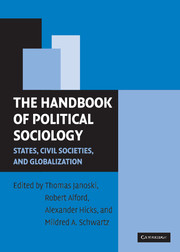Book contents
- Frontmatter
- Contents
- Preface
- Contributors
- Political Sociology in the New Millenium
- PART I THEORIES OF POLITICAL SOCIOLOGY
- PART II CIVIL SOCIETY: THE ROOTS AND PROCESSES OF POLITICAL ACTION
- PART III THE STATE AND ITS MANIFESTATIONS
- 18 State Formation and State Building in Europe
- 19 Transitions to Democracy
- 20 Revolutions and Revolutionary Movements
- 21 Regimes and Contention
- 22 Theories and Practices of Neocorporatism
- 23 Undemocratic Politics in the Twentieth Century and Beyond
- 24 State Bureaucracy
- PART IV STATE POLICY AND INNOVATIONS
- PART V GLOBALIZATION AND POLITICAL SOCIOLOGY
- References
- Name Index
- Subject Index
22 - Theories and Practices of Neocorporatism
Published online by Cambridge University Press: 05 June 2012
- Frontmatter
- Contents
- Preface
- Contributors
- Political Sociology in the New Millenium
- PART I THEORIES OF POLITICAL SOCIOLOGY
- PART II CIVIL SOCIETY: THE ROOTS AND PROCESSES OF POLITICAL ACTION
- PART III THE STATE AND ITS MANIFESTATIONS
- 18 State Formation and State Building in Europe
- 19 Transitions to Democracy
- 20 Revolutions and Revolutionary Movements
- 21 Regimes and Contention
- 22 Theories and Practices of Neocorporatism
- 23 Undemocratic Politics in the Twentieth Century and Beyond
- 24 State Bureaucracy
- PART IV STATE POLICY AND INNOVATIONS
- PART V GLOBALIZATION AND POLITICAL SOCIOLOGY
- References
- Name Index
- Subject Index
Summary
The modern territorial state and the capitalist market economy superseded a political–economic order that consisted of a plethora of corporate communities endowed with traditional rights and obligations, such as churches, estates, cities, and guilds. Organized collectivities of all sorts, more or less closely related to the economic division of labor, regulated cooperation and competition among their members and negotiated their relations with each other. While themselves changing under the impact of modernization, they often resisted the rise of territorial bureaucratic rule and the spread of market relations, sometimes well into the twentieth century. But ultimately they proved unable to prevent the victory of the state form of political organization and of the self-regulating market as the dominant site of economic exchange. Modern liberalism, both political and economic, in turn aimed at abolishing all forms of intermediary organization that intervene between the individual and the state or the market. In the end, however, it failed to eliminate collectivism and had to accommodate itself to both political faction and economic cooperation.
Twenty-first-century political communities are all organized by territorial nation-states. But these had to learn to incorporate organized collectivities and elements of a collective–associative order in their different configurations of bureaucratic hierarchy and free markets. Variation among modern types of government, between the utopian extremes of anarchosyndicalism and Rousseauian radical liberalism, rotates around the relationship between territorial and associative rule (Table 22.1).
- Type
- Chapter
- Information
- The Handbook of Political SociologyStates, Civil Societies, and Globalization, pp. 441 - 460Publisher: Cambridge University PressPrint publication year: 2003
- 19
- Cited by

